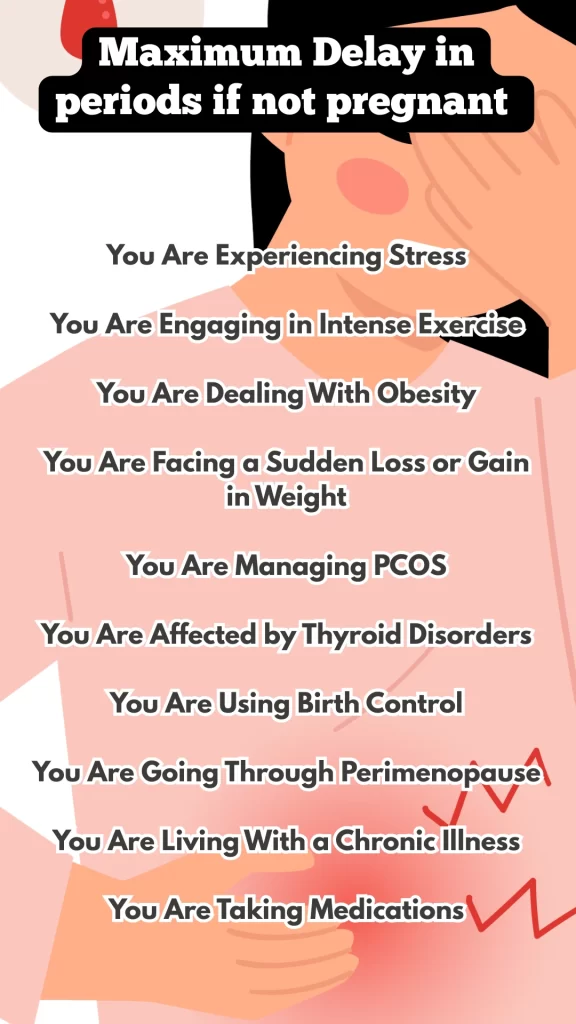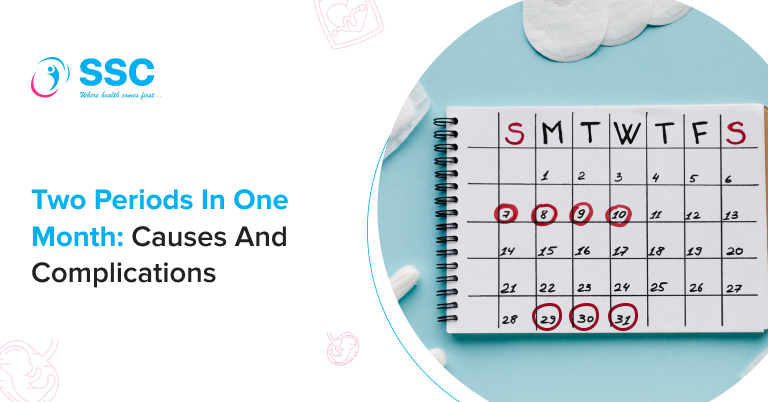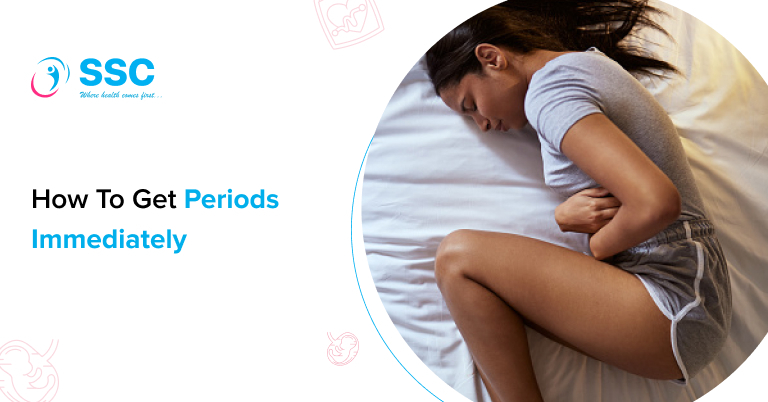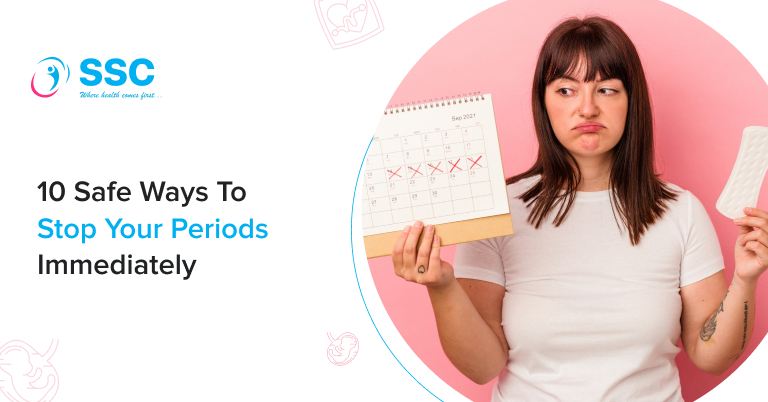Maximum Delay In Periods If Not Pregnant
Key Facts
- Menstrual cycles usually last between 21 to 35 days. A delay of a few days or up to a week is normal and not a big concern. If your cycle is regular, your period should start 24 to 38 days after the last one.
- A period is considered late if it's more than 35 days late. If you're more than 7 days past your expected period, it’s also considered late.
- If your period is missing for 3 months or longer, even with a negative pregnancy test, it could be a condition called secondary amenorrhea, and you should see a doctor.
- Delayed or missed periods can happen because of things like hormonal imbalances, stress, big weight changes, PCOS, or thyroid problems.
- If your period is delayed for more than 3 months, or if you notice other unusual symptoms, it's important to see a gynecologist for advice.
A period is considered late if it is over 35 days late. Your period should start 24 to 38 days after your last one if your cycle is regular. It counts as late if you are seven days past your expected due date. After six weeks, your late period can be considered a missed period.
Your period may be delayed due to lifestyle changes or health conditions. Here are 10 possible causes.
Menstrual Cycle and Late Periods:
The menstrual cycle is your body’s natural process that keeps your reproductive system healthy. It usually lasts between 21 to 35 days, with an average of 28 days. During this time, hormones control ovulation (when your body releases an egg) and menstruation (when your period occurs). It’s normal for cycles to vary a little, but if your period is over 35 days late, it might be a sign that something needs attention.
If your period hasn’t come for more than 3 months, it could be a condition called amenorrhea (when menstruation stops). If pregnancy isn’t the reason, it’s best to visit a gynecologist to find out what’s causing the delay.
Causes of Missed or Late Periods:
Common causes of late periods include:
- Stress
- Intense Exercise
- Obesity
- Sudden Loss or Gain in Weight
- Polycystic ovarian syndrome (PCOS)
- Thyroid disorders
- Birth control
- Perimenopause
- Chronic Illness
- Medications
1. You Are Experiencing Stress:
Stress is one of the primary factors causing delayed periods. The hypothalamus controls your periods. This part of the brain is influenced by stress, anxiety, depression, and lifestyle changes. When stress levels peak, your body releases hormones that activate fight-or-flight mode, focusing on survival and slowing down non-essential functions like reproduction.
At the same time, high stress can disrupt the production of gonadotropin-releasing hormone (GnRH), which controls ovulation and the menstrual cycle.
If stress continues, your body may stay in this mode, temporarily stopping ovulation and causing delayed or irregular periods.
2. You Are Engaging in Intense Exercise:
If you exercise too much, your period might become irregular or even stop, especially if you train for hours every day. This happens when your body burns more calories than it gets, leaving little energy for essential functions like your menstrual cycle.
Losing too much body fat can also make it harder for your body to ovulate, leading to delayed or missed periods.
Intense workouts can affect hormone levels and your cycle. The good news is that your period usually returns to normal when you reduce intense exercise or eat more nutritious foods.
3. You Are Dealing With Obesity:
Gaining weight quickly can affect the brain’s control over your menstrual cycle, especially if your BMI increases.
Obesity can disrupt estrogen and progesterone levels, leading to missed periods and potential fertility problems. Losing weight may help restore a regular cycle for those with obesity.
4. You Are Facing Sudden Loss or Gain in Weight:
A sudden weight gain or loss can affect the hypothalamus, which controls your menstrual cycle. This may lead to delayed periods, irregular ovulation, or even a temporary stop in menstruation.
Eating very few calories can stop your body from making the hormones needed for ovulation. If you’re overweight, your body might make too much estrogen, a hormone that controls your period. Too much or too little estrogen can make your periods irregular or even stop them completely.
5. You Are Managing Polycystic Ovarian Syndrome (PCOS):
Polycystic ovary syndrome (PCOS) is a condition caused by a hormone imbalance that affects ovulation. Many people with PCOS don’t ovulate regularly, which can lead to late or irregular periods.
PCOS doesn’t only affect the ovaries—it also involves the brain’s control center, called the hypothalamus. This disrupts hormone signals from the pituitary gland, which regulates ovulation and hormone production.
As a result, your periods may become lighter or heavier than usual, arrive at irregular times, or even stop altogether.
If you have PCOS, you may experience other symptoms besides irregular periods, such as:
- Weight gain or difficulty losing weight
- Infertility
- Acne
- Hair thinning or hair loss
- Excess hair growth on the face or body
6. You Are Affected by Thyroid Disorders:
The thyroid is a small, butterfly-shaped gland in your neck that helps control many functions in your body, including your menstrual cycle. When the thyroid doesn’t work correctly, it can affect your periods.
If the thyroid is underactive (hypothyroidism), it can slow down ovulation and change your cycle. If it’s overactive (hyperthyroidism), your periods may become irregular, happen less often, or stop altogether.
Both conditions can cause period problems, but hyperthyroidism is more likely to cause missed or delayed periods, sometimes for months.
7. You Are Using Birth Control:
Birth control pills stop ovulation by signalling to the brain that the body has enough hormones. This changes the menstrual cycle leading to delayed or irregular periods. For some women, the pill makes the uterus lining very thin, so there’s little or no bleeding during their period.
After stopping the pill, it may take a few months for your cycle to return to normal. You might miss your period as your body adjusts to its natural hormone levels.
8. You Are Going Through Perimenopause:
Perimenopause is the time before menopause, usually starting in the mid-to-late 40s. It can last for several years before periods stop completely.
A typical early sign is missing periods. You might skip one month and then have regular periods for a few months. Or, you could miss several months and then have a lighter or heavier period than usual.
During perimenopause, estrogen levels slowly decrease because of changes in the brain that control hormones, which affects the menstrual cycle.
9. You Are Living With a Chronic Illness:
Any long-term illness can affect your menstrual cycle because it interacts with the part of the brain that controls it. The effect can be even stronger if the disease also causes weight changes.
Conditions like inflammatory bowel disease, autoimmune disorders, or thyroid problems can all impact how often you get your period.
10. You Are Taking Medications:
Some medicines, like antidepressants, thyroid medications, seizure drugs, and specific cancer treatments, can make your periods late or irregular.
Some common medicines can change hormone levels and blood flow, affecting your cycle. To prevent delayed or irregular periods, it is a good idea to check with a doctor before taking a new medication.

Can staying up late affect your period?
Yes, sleeping late can affect your period. Your body follows a natural clock that controls hormones, including the ones that regulate your menstrual cycle.
If you don’t get enough sleep or stay up too late often, your period may become late, irregular, or even skip a month. Getting enough rest and a regular sleep schedule can help keep your cycle normal.
What is the Maximum Delay in Periods if Not Pregnant?
If you’re not pregnant, a period can be delayed by up to 5 days to 2 months. However, if your period is missing for more than 3 months, it may indicate a condition called amenorrhea. It’s best to consult a gynecologist to find the cause.
A period is considered late if it doesn’t start within 35 days of your last one. If your cycle is regular, your period should come between 24 to 38 days. If it’s more than seven days late, it’s considered delayed.
When to see the Gynecologist?
Missing a period once in a while is usually not a problem. But seeing a doctor is a good idea if you miss more than one or have unusual symptoms. A missed period could be due to conditions like an infection, ectopic pregnancy, or PCOS.
Look out for these signs:
- Stomach pain
- Nausea or vomiting
- Fever
- Frequent headaches
- Blurry vision or vision changes
- Hair loss or thinning
- Unexpected breast discharge
- Excess hair growth on the face or body
Take Away:
Your period is considered late if it doesn’t arrive within your usual cycle.
Many factors can cause a delay, including stress, illness, lifestyle changes, or medications. While occasional delays are usual, frequent late periods may signal a hormonal imbalance or an underlying health issue.
If you miss more than one period, it’s best to see a doctor to determine the cause and get the proper treatment.
Frequently Asked Questions
How late can your period be without being pregnant?
Menstrual cycles can naturally vary, and it’s common for a period to be up to 10 days late. Your body can react to things like emotional stress, a change in diet, or lack of sleep, which may push your period back. Unless your cycle is regularly late or very irregular, it usually isn’t a serious issue.
What to do when your period is late but you’re not pregnant?
If your period is late but you’re not pregnant, look for possible reasons like stress, recent travel, sudden weight changes, or illness. These factors can affect your hormones and delay your cycle. If your period doesn’t start within 2 to 3 weeks, it’s best to see a doctor to check for any underlying health concerns.
Why is my period late if I’m not pregnant?
A late period without pregnancy can happen due to conditions like polycystic ovary syndrome (PCOS), thyroid imbalance, or even recent illness. Medications, including birth control or antidepressants, might also affect your cycle. It's important to monitor your health and track any other unusual symptoms.
Can a period be 12 days late and still not mean pregnancy?
Yes, a 12-day delay does not always mean you're pregnant. Hormones can fluctuate due to many non-pregnancy factors like stress, poor nutrition, or sudden lifestyle shifts. If your test is negative, it may just be a temporary change in your body’s rhythm.
Is it normal to miss a period for 2 months and not be pregnant?
No, missing two periods in a row without pregnancy is not considered normal. It may indicate a deeper issue such as PCOS, early menopause, or a hormonal disorder that needs medical attention. Visiting a doctor can help identify the cause and provide the right treatment.















